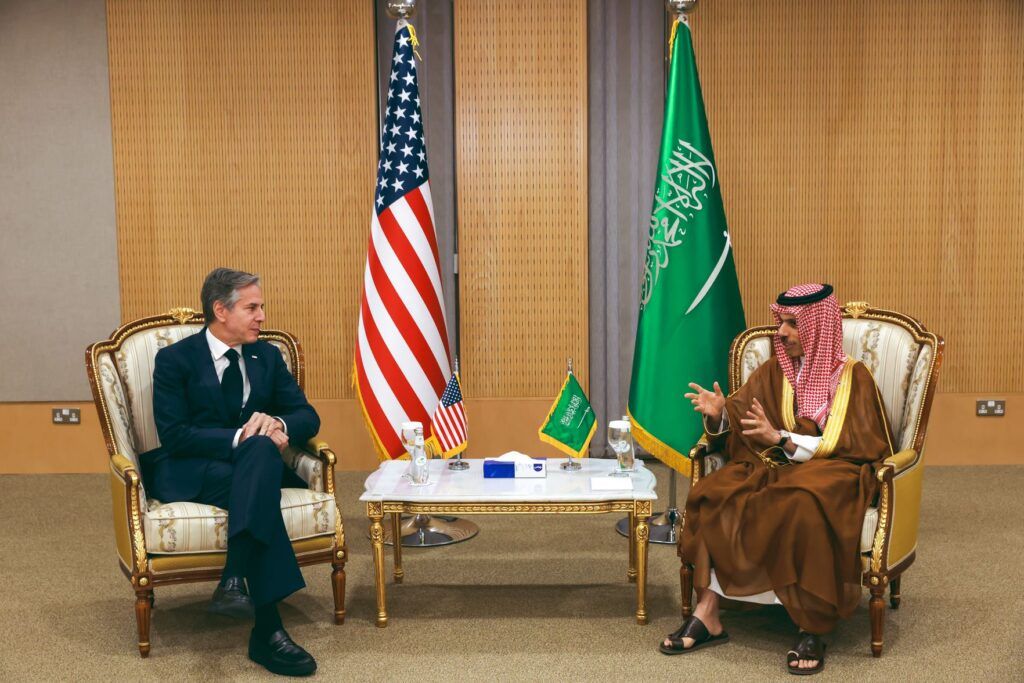
Saudi Arabia’s Nuclear Ambitions: A Game-Changer in Middle Eastern Politics
In a recent development that could reshape the geopolitical landscape of the Middle East, Saudi Crown Prince Mohammed bin Salman has reiterated Saudi Arabia’s intentions to pursue nuclear capabilities if regional rival Iran successfully develops nuclear weapons.
This declaration has thrown a wrench into ongoing negotiations between the United States and Saudi Arabia over potential nuclear cooperation, raising concerns and skepticism among American lawmakers and policymakers.
What’s at Stake?
- US-Saudi Nuclear Cooperation: Negotiations between Washington and Riyadh have been centered around a potential agreement that would normalize relations between Saudi Arabia and Israel. However, the inclusion of substantial nuclear cooperation in this deal has sparked controversy and opposition within the US Congress due to doubts about Saudi Arabia’s true intentions.
- Saudi Arabia’s Nuclear Intentions: Prince Mohammed bin Salman’s comments to Fox News underscore Saudi Arabia’s concerns about Iran’s nuclear ambitions and its readiness to respond if Iran succeeds in acquiring nuclear weapons. This has renewed fears that Saudi Arabia’s ostensibly civilian nuclear program could be diverted for military purposes if regional security threats escalate.
The Biden Administration’s Diplomatic Efforts
- Diplomatic Maneuvers: The Biden administration has invested significant diplomatic capital in brokering a normalization agreement between Saudi Arabia and Israel. This potential deal hinges on US incentives for Saudi participation, including nuclear cooperation without the stringent non-proliferation restrictions typically associated with such agreements.
- Complex Negotiations: Diplomatic sources reveal that any agreement would require Saudi Arabia to move towards diplomatic relations with Israel and resume financial support for the Palestinian Authority. In return, Israel would be expected to make concessions to the Palestinians, aiming to restore US credibility as a mediator in the region and counterbalance Chinese influence.
Congressional Challenges and International Implications
- Congressional Resistance: US lawmakers, including Democratic allies of President Joe Biden, have expressed skepticism and opposition to the prospect of extensive nuclear cooperation with Saudi Arabia. Concerns are particularly focused on the kingdom’s human rights record and the potential misuse of nuclear technology if not strictly regulated.
- Historical Context: Previous attempts to negotiate nuclear cooperation with Riyadh under the Obama administration faltered due to US non-proliferation requirements. The Trump administration continued to uphold these standards, maintaining a deadlock in negotiations. However, the Biden administration’s approach appears more flexible, prompting varied reactions and concerns among policymakers.
Strategic Considerations and Regional Dynamics
- Strategic Competition: The Biden administration views the potential US-Saudi-Israeli agreement through the lens of strategic competition, aiming to counterbalance China’s growing influence in the Gulf region. This perspective underscores the administration’s broader foreign policy goals but risks overshadowing human rights and democracy promotion concerns.
- International Ramifications: Should the US relax non-proliferation conditions for Saudi Arabia, it could set a precedent and potentially lead Riyadh to seek nuclear cooperation from other global powers like China. This scenario presents challenges in ensuring that any nuclear technology transfers adhere to international non-proliferation guidelines.
Future Prospects and Challenges
- Congressional Approval: Administration officials have emphasized the need for any agreement to meet stringent US non-proliferation standards, but the specifics of potential compromises remain unclear. The Biden administration faces an uphill battle in garnering congressional support, especially as discussions intensify ahead of the president’s re-election campaign.
- Global Implications: The outcome of these negotiations could significantly influence the balance of power in the Middle East and US foreign policy priorities. It represents a delicate balancing act between strategic interests, regional stability, and international norms.
As diplomatic efforts continue to unfold, the implications of a potential US-Saudi-Israeli nuclear cooperation deal are profound and far-reaching. The Biden administration’s pursuit of such an agreement reflects a strategic recalibration in US foreign policy priorities, navigating complex regional dynamics while confronting internal and international challenges. Whether this ambitious diplomatic endeavor succeeds or falters remains to be seen, but its impact on global security and Middle Eastern geopolitics is undeniable.
For more trending news, subscribe The Pink Words !







